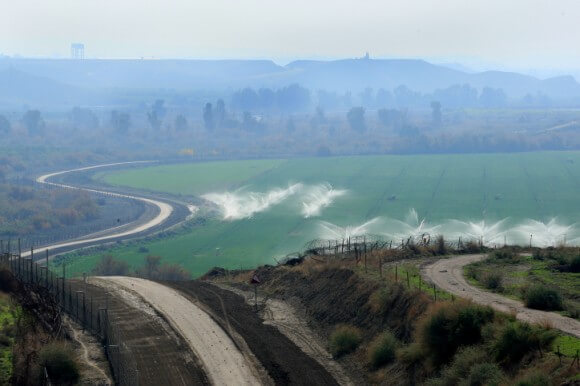
The Associated Press reports that the success of the international boycott movement is starting to squeeze Israeli settlements in the Jordan Valley:
An international campaign to boycott Israeli settlement products has rapidly turned from a distant nuisance into a harsh economic reality for Israeli farmers in the West Bank’s Jordan Valley.
The export-driven income of growers in the valley’s 21 settlements dropped by more than 14 percent, or $29 million, last year, largely because Western European supermarket chains, particularly those in Britain and Scandinavia, are increasingly shunning the area’s peppers, dates, grapes and fresh herbs, settlers say.
“The damage is enormous,” said David Elhayani, head of the Jordan Valley Regional Council, which represents about 7,000 settlers. “In effect, today, we are almost not selling to the (Western) European market anymore.
The article continues:
But economic worries are growing for some of the valley’s farmers.Niva Benzion, who lives in the Netiv Hagdud settlement, used to sell 80 percent of her sweet peppers and grapes to supermarket chains in Western Europe, particularly in Britain.Sales to Western Europe plummeted in the past two years, she said, adding that she now sells mostly to Eastern Europe and Russia, for up to 40 percent less. She reduced her growing area by one-third this season and doubts she can make ends meet in the future.Zvi Avner, head of the agriculture committee in the Jordan Valley, confirmed that sales of peppers and grapes to Western Europe — mainly Britain and Scandinavia — have dropped by about 50 percent and fresh herbs by about 30 to 40 percent.Avner and Elhayani said they are confident they can overcome the difficulties by selling in new markets and by farming more effectively.
Michael Deas, a coordinator for the BDS movement is Europe says, “Supermarkets are now starting to realize that there’s a really big reputational risk involved here.”


Gee, are not the zios telling us BDS is of no consequence.
People are beginning to find it far less intimidating to speak out about this subject.
I will always bend someone,s ear if I see them hovering around Israeli products.Mostly they respond by telling me they were not aware and will be on the lookout for more “Contraband”.
BDS –the best food to cure your zionist disease with.
But how much industrial technology is coming out of the West Bank? This may offset the losses.
BDS will not work. Israel is not South Africa. She has control of key industries.
I saw the strangest thing on MSNBC yesterday…well maybe not so strange considering—-it was a program on the Palestine ‘terrorist’ bombing and attacks on Israelis (years ago) —had Israelis and Jewish Americans injured by the attacks describing their injuries and moaning and etc…..
I didnt have time to watch the whole thing so dont know if it ever showed the Israelis attacks on Palestine—–I really doubt it…….if they didnt then this was **pure political propaganda** by US news outlet….
When major media can be recognized by people in the know as a ‘Propaganda Arm of a State—then we can assume some people are desperate and really panicing over the growing BDS and isolation of bad Israel….and of the growing number of people willing to call it out.
There is no visible, organized BDS movement or group in my area. I have personally avoided buy Irsaeli products (and a few other countries at the same time) whenever possible.
One product that is difficult to purchase is clementines. They tend to fly off the shelves and if you’re a day late then you are out of luck. A supermarket may have a couple of hundred pounds when it gets a shipment.
A while ago a local superstore have had what I would estimate to be a ton of Israeli (clearly labelled) clementines. I’ve never seen a display as large for any single item. Despite sales prices the product remained on the display rotting. A few months later they attempted the same thing with the same result.
Despite the lack of organization and advertising it is clear that people are boycotting Israel products.
I have seen the same thing with with a pre minced garlic product.
Sweet, sweet news!
R. Cohen has another, mostly nutsy, “editorial” in wapo, but he does say this:
“What matters most about the boycotts is what they represent — widespread and growing antipathy toward the Jewish state. It’s facile to attribute this entirely to anti-Semitism, although it surely lurks here and there. But in the United States at least, anti-Semitism is a spent force — witness the appointment of the third Jew in a row to head the Federal Reserve.”
and
“I had lunch with Ariel Sharon about a month before he suffered the stroke that incapacitated him and led to his death Saturday. He strongly suggested that he would do in the West Bank what he had done in Gaza — pursue some sort of withdrawal. The details were murky, but his general intentions were not. Sharon realized that Israel faced a demographic nightmare — too many Palestinians, too few Jews — and maybe also he realized that the occupation was tarnishing one of the 20th century’s resplendent achievements, the creation of a nation from the ashes of Auschwitz. He did not say.
The boycott resolutions are coldly barren of historical understanding or empathy, and they are painful to read. But what they say is not as important as the sound they make. The Israel I love is increasingly hated.”
http://www.washingtonpost.com/opinions/richard-cohen-boycotts-are-a-sign-of-israels-isolation/2014/01/13/8c241b30-7c7f-11e3-93c1-0e888170b723_story.html?hpid=z2